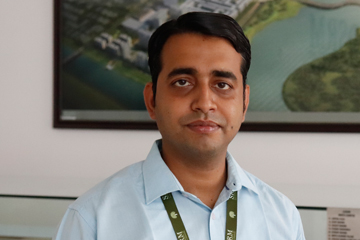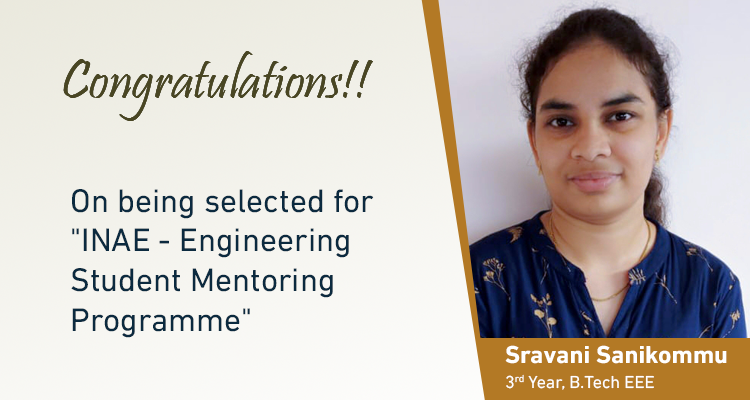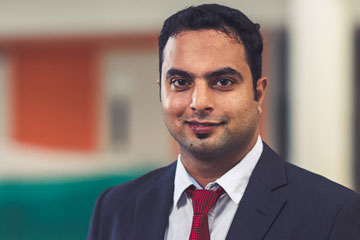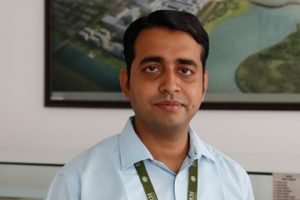Recent News
- Design and implementation of frequency controller for wind energy-based hybrid power system November 10, 2021
 Dr Tarkeshwar Mahto, Assistant Professor, in the Department of Electrical and Electronics Engineering has published a paper titled “Design and Implementation of Frequency Controller for Wind Energy-Based Hybrid Power System Using Quasi-Oppositional Harmonic Search Algorithm” in the reputed research journal, Energies.
Dr Tarkeshwar Mahto, Assistant Professor, in the Department of Electrical and Electronics Engineering has published a paper titled “Design and Implementation of Frequency Controller for Wind Energy-Based Hybrid Power System Using Quasi-Oppositional Harmonic Search Algorithm” in the reputed research journal, Energies.An innovative union of fuzzy controller and proportional-integral-derivative (PID) controller under the environment of fractional order (FO) calculus is described in the present study for an isolated hybrid power system (IHPS) in the context of load frequency control. The proposed controller is designated as FO-fuzzy PID (FO-F-PID) controller. The undertaken model of IHPS presented here involves different independent power-producing units, a wind energy-based generator, a diesel engine-based generator and a device for energy storage (such as a superconducting magnetic energy storage system). The selection of the system and controller gains was achieved through a unique quasi-oppositional harmony search (QOHS) algorithm. The QOHS algorithm is based on the basic harmony search (HS) algorithm, in which the combined concept of quasi-opposition initialization and HS algorithm fastens the profile of convergence for the algorithm. The competency and potency of the intended FO-F-PID controller were verified by comparing its performance with three different controllers (integer-order (IO)-fuzzy-PID (IO-F-PID) controller, FO-PID and IO-PID controller) in terms of deviation in frequency and power under distinct perturbations in load demand conditions. The obtained simulation results validate the cutting-edge functioning of the projected FO-F-PID controller over the IO-F-PID, FO-PID and IO-PID controllers under non-linear and linear functioning conditions. In addition, the intended FO-F-PID controller, considered a hybrid model, proved to be more robust against the mismatches in loading and the non-linearity in the form of rate constraint under the deviation in frequency and power front.
The research group believes that the study will boost the use of renewable energy utilization for fulfilling energy requirements in a more reliable and stable manner. In future, they plan to use the knowledge gained from the isolated systems to develop a Multi-Migrigrid system.
Collaborations:
- Department of Electrical and Electronics Engineering, M S Ramaiah Institute of Technology, Bengaluru 560054, India
- The Berkeley Education Alliance for Research in Singapore, The National University of Singapore, Singapore 138602, Singapore
- Clean and Resilient Energy Systems (CARES) Lab, Texas A&M University, Galveston, TX 77553, USA;
- Department of Electrical Engineering, College of Engineering, Taif University, Taif 21944, Saudi Arabia
- Search for compact IEC systems traversing disciplines June 9, 2021
 “Compact Inertial Electrostatic Confinement D-D Fusion Neutron Generator” is an imbuing research paper co-authored and published by Dr Somesh Vinayak Tewari, Assistant Professor in the Department of Electrical and Electronics Engineering (EEE), SRM University – AP, in the scientific journal, Annals of Nuclear Energy.
“Compact Inertial Electrostatic Confinement D-D Fusion Neutron Generator” is an imbuing research paper co-authored and published by Dr Somesh Vinayak Tewari, Assistant Professor in the Department of Electrical and Electronics Engineering (EEE), SRM University – AP, in the scientific journal, Annals of Nuclear Energy.This paper is part of an interdisciplinary work leveraging the areas of both electrical engineering and physics. Inertial Electrostatic Confinement (IEC) Systems are simple, compact and operate on high voltage discharge in Deuterium- Deuterium (D-D)/ Deuterium-Tritium (D-T) gases between concentric grids for neutron generation. Such systems find considerable applications in the detection of explosives and illicit materials, radiography, tomography, and neutron well logging. The IEC system cathode temperature is measured with a Fibre Bragg Grating (FBG) during the measurement of neutrons from the system. FBG is optical fibre sensors that can be used for sensing temperature by recording the Bragg wavelength shift. The advantage of such measurements is that they can be used in environments such as electric arcs and plasmas, chemical and nuclear zones unaffected by electromagnetic fields such that the signals can be monitored remotely.
The production of neutron fluxes for the above-mentioned applications is through radioisotopes, accelerators, or nuclear reactors with the inherent nature of their complexity, hazards, and problem of residual radioactivity. Additionally, such systems require a considerable amount of shielding and Dr Tewari puts forth such factors that prompt further research in the area of the development of much simpler compact IEC systems.
The said research project has been carried out under the scheme of “Mentoring of Engineering Teacher by an INAE Fellow”, financially supported by the Indian National Academy of Engineering. The work goes forward in close collaboration with Pulsed Power & Electromagnetic Division, Beam Technology Development Group, Bhabha Atomic Research Centre (BARC)-Vishakhapatnam.
The future projects of Dr Tewari involve working on simulations related to the compact IEC for study, analysis, optimization of different parameters of an IEC system and related experimentation in collaboration with BARC.
Continue reading → - 3rd Year EEE Student Selected for Prestigious “INAE – Engineering Student Mentoring Programme” June 4, 2021
 Ms Sravani Sanikommu, a vibrant and keen third-year Electrical and Electronics Engineering (EEE) student from SRM University-AP, has been selected for the prestigious Mentoring of Engineering Students by INAE Fellows Programme by the Governing Council of Indian National Academy of Engineering (INAE). She is one amongst 59 brilliant students who have been selected from across the country this year. The objective of this distinguished programme is to mentor outstanding B.E/BTech undergraduates by INAE fellows. Meritorious 3rd /4th year B.E./B. Tech students from recognised Engineering institutions are eligible under the scheme. Candidates must have a minimum of 75% or a CGPA of 7.5 to be considered for this programme. The mentorship program takes place through an online medium.
Ms Sravani Sanikommu, a vibrant and keen third-year Electrical and Electronics Engineering (EEE) student from SRM University-AP, has been selected for the prestigious Mentoring of Engineering Students by INAE Fellows Programme by the Governing Council of Indian National Academy of Engineering (INAE). She is one amongst 59 brilliant students who have been selected from across the country this year. The objective of this distinguished programme is to mentor outstanding B.E/BTech undergraduates by INAE fellows. Meritorious 3rd /4th year B.E./B. Tech students from recognised Engineering institutions are eligible under the scheme. Candidates must have a minimum of 75% or a CGPA of 7.5 to be considered for this programme. The mentorship program takes place through an online medium.The Governing Council of the Indian National Academy of Engineers (INAE) designed the mentoring programme to encourage future engineers in the nation to make significant contributions to engineering and technology for holistic solutions. Due to COVID-19 pandemic, online internship is also available. Ms Sravani gets an opportunity to work online in the host institution in the field of power electronics under the able mentorship of INAE Fellow Prof B G Fernandes, Electrical Engineering, Indian Institute of Technology Bombay (https://www.ee.iitb.ac.in/wiki/faculty/bgf) for 2 Months. She extended her gratitude to Dr Tousif Khan N, the Head of the Department, and Prof Sastry V Vedula, a distinguished visiting professor in the Department of Electrical and Electronics Engineering, as well as an INAE fellow, for initiating her into the mentoring programme and providing constant guidance.
Sravani stated that she had complete supervision of faculty members of SRM-AP during the preparation for this two month Mentoring Programme. The extensive research expertise of faculty members aided significantly throughout the selection process among the finest applicants. “I thank everybody who has put efforts into making this happen. SRMAP can provide such amazing opportunities to research in the fields in which students are interested in working. This is made possible through the faculty members who are experienced in the specified fields which helps the students to learn more about the subject and form a substantial idea on how the concepts work. If somebody is keenly interested in research on something they love and are very passionate about it, SRMAP is the right place!!”, said Ms Sravani with overwhelming enthusiasm.
Continue reading → - Dr Tousif Khan N elected as a Joint Secretary of ACDOS November 17, 2020
 Dr Tousif Khan N, Head of the Department, Electrical and Electronics Engineering at SRM University-AP, Andhra Pradesh has been elected as a Joint Secretary (2020-2023) of the prestigious Automatic Control and Dynamic Optimization Society (ACDOS), Indian national member organization of International Federation of Automatic Control (IFAC). The objective of ACDOS is to promote automatic control and dynamic optimization fields in academia and industry across India. The society aims to host international conferences and technical workshops regularly in order to promote close interaction between industry professionals and academia. The society also participates in curriculum development for graduate and under-graduate studies in addition to facilitating productive research in this area. The society volunteers to honour eminent persons who excelled in this field in industry and academic circles.
Dr Tousif Khan N, Head of the Department, Electrical and Electronics Engineering at SRM University-AP, Andhra Pradesh has been elected as a Joint Secretary (2020-2023) of the prestigious Automatic Control and Dynamic Optimization Society (ACDOS), Indian national member organization of International Federation of Automatic Control (IFAC). The objective of ACDOS is to promote automatic control and dynamic optimization fields in academia and industry across India. The society aims to host international conferences and technical workshops regularly in order to promote close interaction between industry professionals and academia. The society also participates in curriculum development for graduate and under-graduate studies in addition to facilitating productive research in this area. The society volunteers to honour eminent persons who excelled in this field in industry and academic circles. Dr Tousif Khan N is an Assistant Professor in the Department of Electronics and Electrical Engineering at SRM University-AP, Andhra Pradesh. He has obtained his PhD from Indian Institute of Technology, Guwahati. Apart from performing his duties as a teacher, he is pursuing his research career in Control systems, Power Electronics and Optimization Techniques. The very young and talented professor has been honoured with several awards and recognitions for his pursuits in the domains of Teaching and Research. As a Joint Secretary of ACDOS, Dr Khan wishes to contribute further to the versatile worlds of Research and Academia.
The other members of ACDOS are eminent researchers and scientists such as Prof. Sukumar Mishra (IIT Delhi) as President, Dr Jayesh Barve (GE, Bangalore) as Vice-President and President-Elect, Dr Shaik Faruque Ali (IIT Madras) Vice-President, Prof Bidyadhar Subudhi (IIT Goa) as Vice-President, Dr Arnab Maity (IIT Bombay) as General Secretary, Dr S. N Omkar (IISc-Bangalore) as Treasurer and Prof Radhakant Padhi (IISc Bangalore) as Director of Operations.
To know more about ACDOS, please click the link: https://www.acdos.org/
Continue reading → - SRMAP’s collaborative research on Inertial Electrostatic Confinement with BARC. September 15, 2020
Dr Somesh Tiwari has received Mentoring of Engineering Teachers by INAE (Indian National Academy of Engineering) Fellowship -2020.

Dr Somesh Vinayak Tewari, Assistant Professor, Department of Electronics and Electrical Engineering, brings another honour for SRM University-AP. He has been selected for Mentoring of Engineering Teachers by INAE (Indian National Academy of Engineering) Fellowship -2020. His mentor during the programme will be Dr Archana Sharma, FIE, FNAE, Outstanding Scientist, Bhabha Atomic Research Centre.
The INAE (Indian National Academy of Engineering) provides funding to an Engineering Teacher for carrying out research in the selected/proposed area to be mentored by an INAE fellow. The scheme attempts to increase the knowledge base and is instrumental in building long term collaborations. Such mentoring program helps in bridging the collaboration between an academic area and a research and development organization which is extremely necessary to sow the seeds of research in young and energetic brains so that they are able to translate their research ideas for further growth. This interaction of ideas leads to a win-win situation for both the University and the research organization. The prestigious and highly competitive fellowship receives thousands of applications nationwide though only fifteen of them finally are selected for the fellowship this year by INAE. Dr Somesh is one of fifteen outstanding researchers.
Dr Tiwari will be working on the proposed research topic- “Studies on Inertial Electrostatic Confinement Concept in Deuterium gas environment”. Inertial Electrostatic Confinement (IEC) is an alternative concept to Magnetic and Inertial fusion. IEC fusion device is an extremely compact and simple device, running by high voltage as discharge on Deuterium -Deuterium/Deuterium-Tritium/Deuterium -3He fuel gases. Studies related to IEC find application in the areas of dosimeter calibration, isotope production, radiography, and has medical applications. Such a research is multifaceted and helps an engineering teacher to enhance his skills in experimental areas of high voltage, plasma physics, vacuum techniques, radiation detection and measurement and in numerical methods and simulation leading to a comprehensive analysis of a given problem. During the two months of the fellowship, Dr Archana Sharma will be mentoring the project. It is an excellent opportunity for our faculty to work with such a renowned scientist in such close proximity. The collaboration will be beneficial for both institutions.
Continue reading →

